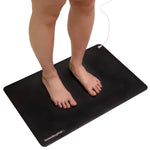Why You Should Consider Grounding Your Bed for Better Sleep and Health
por Joanna Sullivan en Jul 23, 2023

If you ever wake up feeling wiped out, even after a full night’s rest or if you deal with nagging inflammation and pain that just won’t go away, grounding your bed could be something worth exploring.
Grounding (sometimes called earthing) is basically a way of reconnecting your body with the Earth’s natural electrical energy. You probably know you can walk barefoot outside and “ground” yourself, but did you know you can bring that same idea into your sleeping space?
In this post, I’ll walk you through what grounding is, why it might benefit your health (and sleep), how to actually do it, and what you need to know before you try.
What Is Grounding (aka Earthing)?
Grounding means establishing a connection between your body and the Earth’s natural electrical charge. Over time, many of us have become isolated from that connection. We wear rubber-soled shoes, sleep on insulating mattresses, and live in buildings that block the Earth’s energy.
By grounding your bed, you're essentially creating a path for the Earth’s symmetrical energy to flow into your body while you sleep. The idea: this flow can help balance your body, reduce excess electrical charge, and support natural healing processes.
What Science & Studies Suggest
Before you dismiss this as a wellness fad, there’s some intriguing research to look at:
- In one study, people who were “grounded” during sleep reported that they fell asleep more easily, stayed asleep longer, and woke feeling more refreshed.
- Other studies suggest grounding might help reduce inflammation and alleviate pain by allowing excess free radicals (imbalanced electrical charges) in the body to neutralize.
- There’s also data hinting at lower stress levels (less cortisol), better blood flow, and even boosted immune function when grounding is practiced.
While the body of evidence is still growing, these findings point toward interesting possibilities.
Possible Health & Sleep Benefits
Here’s what grounding your bed might help with (based on available studies):
- Better sleep: falling asleep faster, fewer interruptions, waking up more refreshed
- Less inflammation and pain relief (especially in chronic pain conditions)
- Reduced stress & improved relaxation
- Improved circulation and cardiovascular health
- Stronger immune responses
- Better mood and a general sense of well-being
Again, these are potential benefits. Everyone’s body reacts differently, so your mileage may vary.
How to Ground Your Bed
If you’re curious and want to try it out, here are some ways to ground your sleeping setup:
-
Grounding bed sheets
Sheets made with conductive materials (e.g. silver or carbon threads) can be connected to a grounding outlet or rod. You sleep on them like regular sheets.
-
Grounding mats
Place a mat under your mattress or on top of it. You lie (or partially lie) on it, and it connects to the ground through a wire.
-
DIY options
If you’re handy, you can build your own grounding system using conductive materials and wires. That said, these DIY setups may not be as reliable or comfortable as professionally designed products.
Make sure that whatever you use is safely and properly grounded; following the manufacturer's instructions is key.
Let’s Wrap It Up
Our ancestors were naturally grounded, walking barefoot, sleeping on the Earth, and being in direct contact with nature. As modern life insulated us, we disconnected. Grounding your bed is a way to reclaim some of that natural contact, possibly supporting better sleep, reduced pain, less stress, and more vitality.
If you’re curious, try it for yourself. Use a grounding sheet or mat, set it up properly, and see how your body responds. It could be one simple change that makes your nights (and days) feel a bit better.
FAQs
Q: Does grounding your bed really work?
Many people report improvements in sleep, pain levels, and stress. While scientific research is still emerging, there’s enough evidence to suggest it’s worth trying for yourself.
Q: How exactly does grounding your body while sleeping help you?
The idea is that the Earth’s electrons help neutralize excess free radicals in your body, reduce inflammation, and support the nervous system’s natural regulation, all of which may lead to better sleep and overall balance.
Q: Is it safe to sleep on a grounding mat or sheet?
Yes, as long as the mat or sheet is properly grounded and installed following the instructions. Using faulty wiring or skipping safety steps can be a risk, so be cautious.
Q: How long do I need to ground each night?
There’s no strict rule, but many people use grounding tools the entire night. Even 30 minutes can provide some benefit. The more consistent you are, the better chance your body has to respond.
Q: Can grounding help with chronic pain or inflammation?
Some studies and anecdotal reports suggest it might. Grounding may help reduce markers of inflammation and ease discomfort, particularly for people dealing with chronic conditions.
Q: What’s the difference between “earthing” and “grounding”?
In wellness contexts, they’re often used interchangeably. “Earthing” sometimes refers to walking barefoot outdoors, while “grounding” tends to refer to using products (sheets, mats) to connect while indoors. But for most people, there’s no real distinction in meaning.









